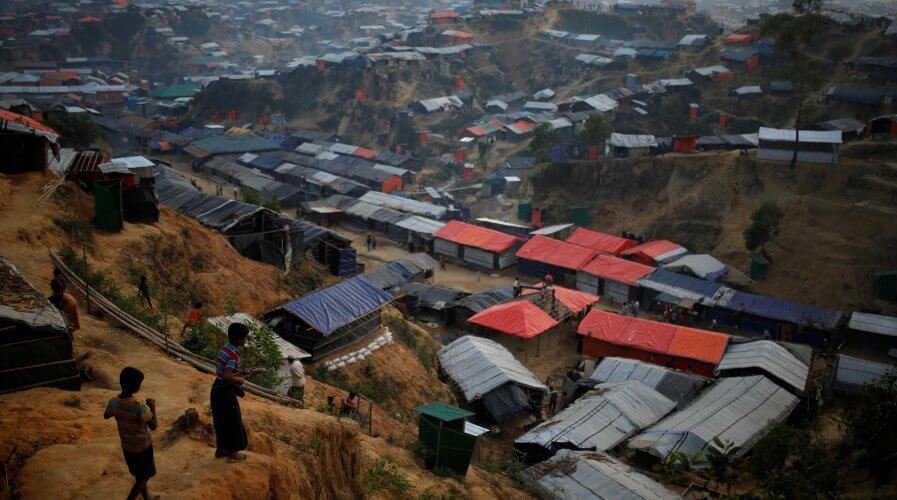
A general view of the Balukhali refugee camp near Cox’s Bazar, Bangladesh Dec 20, 2017. Source: Reuters
Humanitarian group uses blockchain tech to give Rohingya digital ID cards
A NON-GOVERNMENTAL ORGANISATION is using blockchain technology to provide stateless Rohingya refugees who fled Burma (Myanmar) with digital identity cards in a pilot project aimed at giving access to services like banking and education.
The first 1,000 people to benefit from the project in 2018 will be members of the diaspora in Malaysia, Bangladesh and Saudi Arabia, decades-old safe havens for the Rohingya, who are the world’s biggest stateless minority.
“They are disenfranchised,” Kyri Andreou, co-founder of The Rohingya Project, which is organising the initiative, said at its launch in Kuala Lumpur on Wednesday.
“They are shut out. One of the key aspects is because of the lack of identification.”
More than 650,000 Rohingya Muslims – who are denied citizenship in Buddhist-majority Burma – have fled to Bangladesh since August after attacks by insurgents triggered a response by Burma’s army and Buddhist vigilantes.
The Rohingya Project estimates there are four million Rohingya around the world, the majority living outside their ancestral land since Burma excluded them from the country’s recognised ethnic groups in 1982, effectively rendering them stateless.
Blockchain, the technology behind the bitcoin currency, will be used to issue individual digital IDs to people once they have taken a test to verify that they are genuine Rohingya.
It aims to improve the stateless Rohingya access to public services, such as hospitals, which is often difficult, as well as restoring their dignity, the project’s founders said.

Blockchain works off a public ledger that tracks permanent transactions. Source: Shutterstock
“We are trying to put a smile on the Rohingya’s face who has been crying for decades,” said another co-founder Muhammad Noor, a Rohingya who first came to Malaysia in 2000.
“This is a ray of hope.”
“This project will engage public support to address the problems of statelessness and financial exclusion for the future of the Rohingya,” Muhammad Noor said.
According to The Sun, Muhammad Noor said the project focuses on two aspects – identity and opportunity – in which the system will provide the first verified data on Rohingya census across the world.
Individual Rohingya, he said, shall have their ancestry authentically identified to link them directly to their original land of dispersion, The Sun reported.
Blockchain is a digital shared record of transactions maintained by a network of computers on the Internet, without the need of a centralised authority.
It has gained popularity among humanitarians in recent years, with charities using it to transfer money cheaply and disburse aid to refugees.
United Nations refugee agency UNHCR said in November that the Rohingya are the biggest minority among an estimated 10 million people worldwide who are stateless, a status that deprives them of an identity, rights, and often jobs.
Additional reporting by Reuters
READ MORE
- Strategies for Democratizing GenAI
- The criticality of endpoint management in cybersecurity and operations
- Ethical AI: The renewed importance of safeguarding data and customer privacy in Generative AI applications
- How Japan balances AI-driven opportunities with cybersecurity needs
- Deploying SASE: Benchmarking your approach




